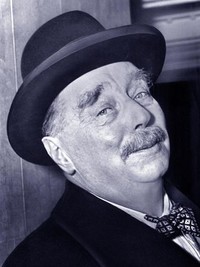H.G. Wells

Unquestionably one of the most popular authors in literary history, British writer H.G. Wells created a world of scientific wonder and technological discovery in such classic novels as The Time Machine (1895), The Island of Dr. Moreau (1896 and The War of the Worlds (1898) that helped to give rise to the science fiction genre. Wells' work predicted major word wars, population movement from urban to suburban areas and wireless communication at a time when such accomplishments were still the stuff of fantasy, by presenting them in thrilling adventures that continued to capture the imagination of readers a century later. His work also proved ideal for film and television adaptations, which strove mightily to translate his scope and vision through elaborate special effects. Wells' novels also injected social and political commentary into his "scientific romances," and penned numerous world histories and scientific tomes over the course of prolific career. More significantly, Wells was a part of the foundation on which the whole of science fiction was built, inspiring writers and filmmakers to imagine the furthest reaches of human achievement. H.G. Wells' body of work placed him among a select number of 19th century and early 20th century authors whose writing had a profound influence on the written and visual entertainment of the centuries that followed.